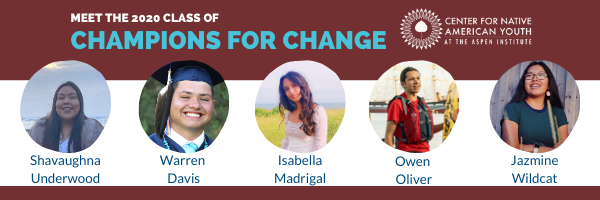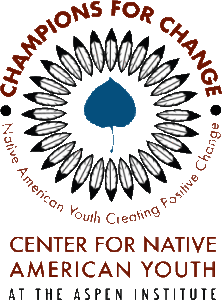
- Details
- By Native News Online Staff
WASHINGTON — The Aspen Institute’s Center for Native American Youth (CNAY) welcomes its eighth cohort of CNAY Champions for Change (Champions) to Washington, DC, next month. This marks the first convening of the year--long leadership program.
The 2020 Champions include Owen L. Oliver (Quinault (Chinook) Indian Nation & Isleta Pueblo), Jazmine Wildcat (Northern Arapaho), Warren Davis (Navajo Nation), Isabella Madrigal (Cahuilla Band of Indians & Turtle Mountain Band of Chippewa Indians), and Shavaughna Underwood (Quinault Indian Nation).
“When we created the first Champions program eight years ago, I saw its impact on these young leaders and knew we needed to do this every year,” said CNAY founder and Board of Advisors Chair, Sen. Byron Dorgan (ret.). “Today, I’m so proud that we created a program that shines all the spotlights on these remarkable Native youth who are doing great things for their communities.”

Each year, CNAY selects five inspirational Native youth, ages 14-24 from across the United States to be Champions for Change. Champions are up-and-coming leaders with a desire to better their communities. The Champions program is a Native youth leadership initiative designed to highlight positive stories impacting Indian Country through experience-based learning and tailored advocacy training.
As a group, the 2020 Champions are working to revitalize language and culture, advocate for gun control, destigmatize mental illness, implement traditional coping mechanisms for intergenerational trauma, increase visibility and Native storytelling, among other important initiatives.
“These inspiring young leaders are joining a community and national network of other leaders from across the country,” said Erik Stegman, Executive Director for CNAY. “We’re incredibly proud of their commitment to their communities and we’re honored that the Champions program can provide them a new platform for creating change.”
The Champions will participate in a panel discussion at The Aspen Institute in Washington, DC next month to share their stories. CNAY encourages the public to attend a panel discussion with the 2020 Champions for Change on February 11th, 2019.
More Stories Like This
Native News Weekly (August 25, 2024): D.C. BriefsUS Presidents in Their Own Words Concerning American Indians
Next on Native Bidaské: Preserving Indian Health with A.C. Locklear
Hozhonigo Institute Helps Drive $34.5M in Grant Pipeline for Tribal Communities
Torres, LaMalfa Lead Push to Safeguard Culturally Important Tribal Seed Varieties
Help us defend tribal sovereignty.
At Native News Online, our mission is rooted in telling the stories that strengthen sovereignty and uplift Indigenous voices — not just at year’s end, but every single day.
Because of your generosity last year, we were able to keep our reporters on the ground in tribal communities, at national gatherings and in the halls of Congress — covering the issues that matter most to Indian Country: sovereignty, culture, education, health and economic opportunity.
That support sustained us through a tough year in 2025. Now, as we look to the year ahead, we need your help right now to ensure warrior journalism remains strong — reporting that defends tribal sovereignty, amplifies Native truth, and holds power accountable.
 The stakes couldn't be higher. Your support keeps Native voices heard, Native stories told and Native sovereignty defended.
The stakes couldn't be higher. Your support keeps Native voices heard, Native stories told and Native sovereignty defended.
Stand with Warrior Journalism today.
Levi Rickert (Potawatomi), Editor & Publisher

